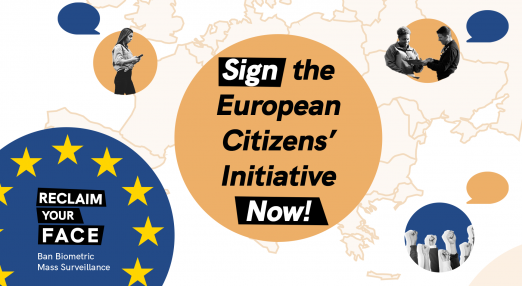Privacy and confidentiality
Filter resources
-

Everyone wants to encourage encryption, except for one minister
The Department of Justice and Security in the Netherlands seems to be holding on to the idea that it is possible to weaken encryption "just a little". Simultaneously, the parliament and a monster alliance of organizations tells the minister over and over again: it's impossible. EDRi's member Bits of Freedom sheds some light on the on-going debate on the question.
Read more
-

Stop Spying on Asylum Seekers!
How would you feel if the government was literally able to cut off your access to your cash, because your buying habits were deemed suspicious? That's the reality for many UK based asylum seekers, spied on by the Home Office through their 'Aspen Card', the debit payment card they rely on for their basic subsistence and survival. Join our member Privacy International in their efforts to stop the government's harmful practices of spying on some of the most vulnerable members of our society.
Read more
-

No faces left to hack: #ReclaimYourFace Now!
We cannot let power-hungry and profit-orientated technologies manipulate our future, take away our dignity and treat us like walking, breathing barcodes. We have the right to exercise our autonomy and self-determination free from abusive practices undermining our agency. The Reclaim Your Face’s ECI empowers Europeans to move and shape the public debate on the use of these AI-powered biometric technologies. The EU has the chance to show that people sit at the center of its values, by taking the lead to ban biometric mass surveillance that endangers our freedoms, democracies and futures.
Read more
-

Campaign against surveillance: Nobody will tell you when they will follow you
The rapid growth of new technologies has been of “benefit” to secret services. However, it seems that the law has lacked behind showing its inability to reflect the new methods of surveillance used by secret services around the world. EDRi's member Panoptykon Foundation has launched a campaign in Poland to show the problem of unscrutinised powers of secret services.
Read more
-

Trust is a two-way street: the UK’s digital identity framework
Trust is a two-way street, and while the British government’s digital identity trust framework definitely makes steps in the right direction, those efforts need to be accompanied by a commitment to transparency and integrity, says EDRi's member Open Rights Group in response to the government's policy paper on UK’s digital identity and attributes trust framework.
Read more
-

Google’s FLoC Is a Terrible Idea
Google is leading the charge to replace third-party cookies with a new suite of technologies to target ads on the Web. And some of its proposals show that it hasn’t learned the right lessons from the ongoing backlash to the surveillance business model. In this post, EDRi's member Electronic Frontier Foundation (EFF) will focus on one of those proposals, Federated Learning of Cohorts (FLoC), which is perhaps the most ambitious—and potentially the most harmful.
Read more
-

At a glance: Does the EU Digital Services Act protect freedom of expression?
The Digital Services Act is in many ways an ambitious piece of legislation that seeks to make ‘Big Tech’ accountable to public authorities through new significant transparency and due diligence obligations. It also contains many provisions that could help protect users’ fundamental rights. Whether it will be successful at protecting freedom of expression from undue restrictions or reining in the power of Big Tech rather than cementing it, is, however, questionable. EDRi's member ARTICLE 19 share its first thoughts on why.
Read more
-

“Anytime and anywhere”: Vaccination, immunity certificates, and the permanent pandemic
The deployment of vaccines, and in particular any “immunity passport” or certificate linked to the vaccination, must respect human rights. EDRi's member Privacy International (PI) reveals some of the broader human rights, ethical and societal implications of vaccination "passports".
Read more
-

Targeted Online: How Big Tech’s business model sells your deepest secrets for profit
Surveillance-based advertising which is currently the business model used by Google, Facebook and many others is harmful to people and to society as a whole because it encourages the spread of disinformation. It's also bad for the media who lose control of their ad space and suffer from decreasing revenue as a result.
Read more
-

Booklet: Surveillance-based advertising: An industry broken by design and by default
Most online advertising today relies on huge amounts of personal data extracted from people without their knowledge. EDRi’s new guide book “Targeted Online” sheds light on this opaque data industry and explores how EU law should regulate it. This is the first blog post in a new series dedicated to the EU’s proposed Digital Services Act and Digital Markets Act.
Read more
-

ePrivacy strikes back
“And when we woke up, the ePrivacy Regulation was still there”, could be the EU bubble version of the famous micro-tale. Four years after the main text protecting privacy and confidentiality of people in the EU was proposed, Member States have finally given the green light to finalise the adoption. But, where will this lead us?
Read more
-

ECI: putting people’s voices before corporate greed
On 17 February 2021, EDRi with a coalition of 40 human rights and social justice groups launched a unique, officially-recognised EU petition, called a “European Citizens’ Initiative” (ECI). Here, we explain why and how this ECI is a powerful tool for our Reclaim Your Face campaign that aims to ban biometric mass surveillance, as well as for our wider European advocacy against harmful uses of artificial intelligence-based technologies.
Read more
